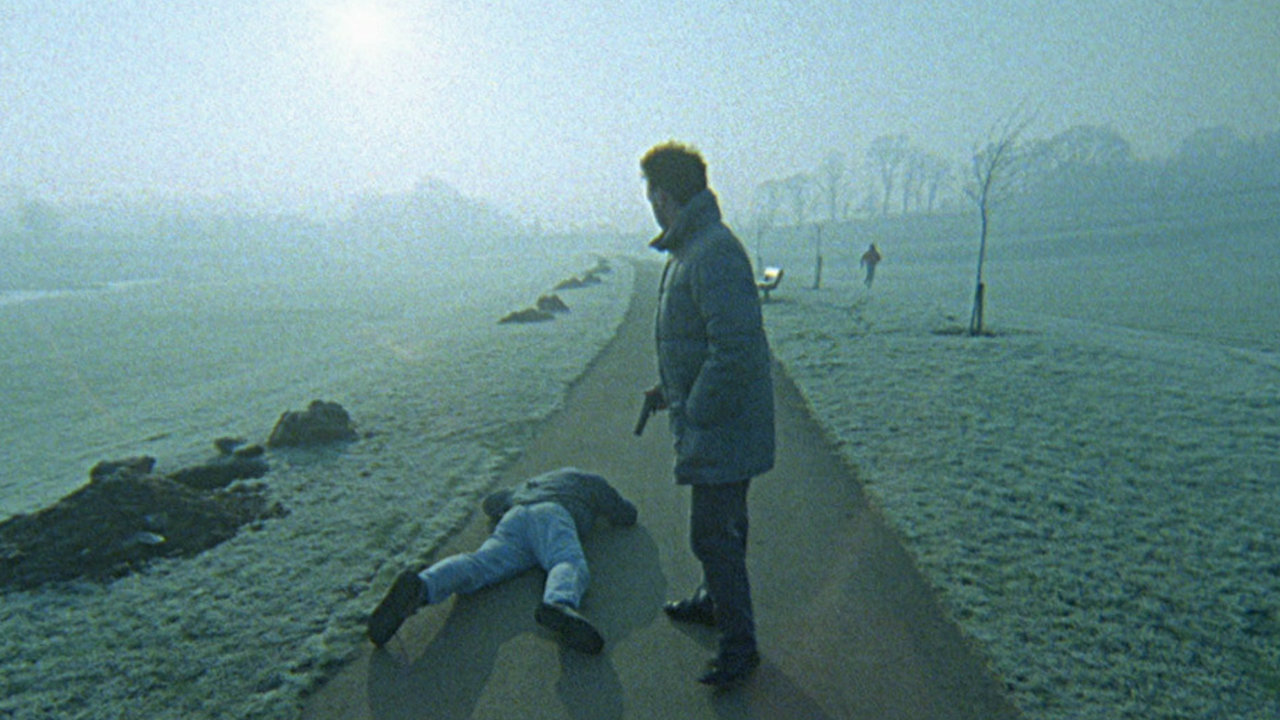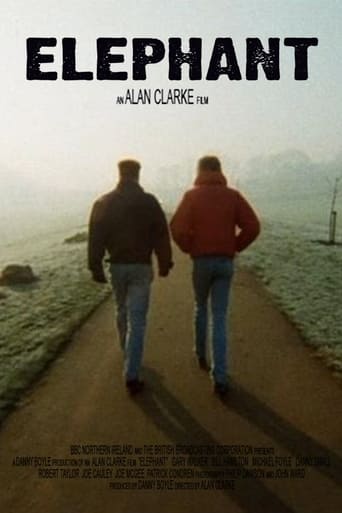



Horrible, fascist and poorly acted
Disturbing yet enthralling
The performances transcend the film's tropes, grounding it in characters that feel more complete than this subgenre often produces.
View MoreThe film makes a home in your brain and the only cure is to see it again.
View MoreThis short film serves two purposes. It provides a chilling perspective on the anonymity of civil conflict and it offers a meditation on violence in the media. The premise is equally primitive and thought- provoking. It simply follows around random, casually dressed men (who look like members of The Smiths and Big Country) as they slay other men in dilapidated Belfast settings. The minimal soundtrack of footsteps and gunfire creates a hypnotic and creepy atmosphere. All of the sound and lack thereof is necessary. The closeups of the handguns are necessary, as are the lingering shots of post-mortem bodies. Seconds can feel like minutes. Clarke's attempt to confront the audience forces us to ponder the dehumanization of The Troubles in Northern Ireland. The irony behind the appeal of this film is that for those who wish to watch violent action movies just for the sake of the spectacle of violence will be the most disappointed. That is exactly why this film is so important. It numbs us to violence. The lack of a narrative provides us the question of why we want to see what we are seeing. To turn gratuitous, prolonged violence into something boring becomes a statement on how desensitized a society can become to death and war.
View More"Elephant" is a 36-minute short film from over 25 years ago. It was one of the last works of director Alan Clarke before he died from cancer. The film's produces is Academy Award-winning director Danny Boyle ("Slumdog Millionaire"). Well what can one say about this. It's basically from start to finish men walking around shooting other men, in the streets, in warehouses, in offices etc. We do not find out who the killers are and we don't know who the victims are. There is no real dialog in here, especially the killers are always quiet. There is some irony to it, some black humor for sure when for example one of the murderers plays football with his victim. And he does not kill all of them. So maybe they are contract killers? Then again, some act pretty amateurish for that when they keep pushing bullets in the already dead body. Anyway, you certainly do not have to fear graphic violence and maybe also need a bit of a sadistic touch when you watch this. Strange little short film. All in all, not recommended. It just gets repetitive at some point and should not have crossed the 20-minute mark in my opinion.
View MoreDirector Alan Clarke knew instinctively that to make a film about the sectarian violence in Northern Ireland, could be politically suicidal. The violence was still going on when this film was made in 1989, after all. This is why "Elephant", in my opinion, was a stroke of genius. It doesn't get bogged down trying to walk the fine line of being neutral on such an explosive issue and appearing downright biased. No film about Ireland's "Troubles" will satisfy both Protestant and Catholic. The seeds of this catastrophe began when the British government decided to partition Ireland Ireland in 1921. Though the population of Northern Ireland was both Catholic and Protestant, the Catholics were in the minority, and were outrageously discriminated against by a political machine that was heavily Protestant. That's not to say that the Catholic population were not also responsible for incidents of provocation. Violence erupted on the twin anniversary of the Battle of The Somme and The Easter Uprising: the government's response was to bring in troops from Britain to control the violence. Then, in 1972, a British Parachute regiment killed thirteen demonstrators during a civil rights march, forever after known as "Bloody Sunday." From then on, the frequency of the confrontations between Catholic and Protestant, escalated and grew in intensity - in one year alone, over 500 men, women, and children were killed due to what was basically "Religious", as it was about self-rule. In thirty years, an estimated 3523 people lost their lives. Alan Clarke's answer in making a film about the "Troubles", is "Elephant." It is not the definitive film about Northern Ireland, but it is a brave, and I think successful, attempt, that Alan Clarke should be praised rather than denigrated. They say an elephant never forgets. Once seen, you'll never forget this film. It's interesting that Gus Van Sant used the same title for his film about the random act of violence at Columbine High School. Incidentally, eighteen years after his death, a boxed set of the films Alan Clarke is best known for, includes "Scum" (both the TV and theatrical release), "The Firm", "Made In Britain", and "Elephant", is finally available.
View MoreWhat a brilliant film! It's been said that this is, "The single, most radical, television film ever made, both politically and ascetically!" Right from the get-go Clarke creates a setting of tension as we find ourselves following a man, unknowing of what is about to occour. We soon find out what we are about to witness- a number of pre-meditated murders in Northern Ireland- but do not know for what reasons. In this film Clarke pseudo-documents the most ugly social aspect of society in the most beautiful fashion. I would have to say that this is one of his most artistic films, in which he succeeds in, not only keeping the mood, but also creating a visually appealing masterpiece. Clarke takes us through a number of situations in which we either begin by following the killer or the victim. The fact that we are unaware of which we are following at the beginning of each new segment allows Clarke to maintain a mood of tension throughout the entire film, while also preventing things from becoming too predictable. One effective technique that he utilizes, is that he makes us take part in the killing. We witness the killings from the perspective of the killers, and are then forced to become onlookers of the pre-meditated crimes, reminding us that, though filmed very beautifully, we are witnessing a very ugly part of human nature. The realism of the scenes contribute to the overall mood of the film. Some scenes were especially affective in creating feelings of tension and unease, as we know something is going to happen, but when? and by whom? remains unclear. These scenes tended to be some of the most memorable, including the football scene and the double murder by shotgun in the upper level apartment. All this considered, I would have to agree with the quote mentioned at the beginning, that this is definitely one of the most radical films, politically and ascetically, ever made for television. As I could not imagine such a film being played on television these days without evoking a dramatically angry response from most conservative viewers. But you have to remember that this film was meant to evoke a response, both within ourselves, and in turn within society, and it succeeds in doing so. I would definitely recommend this film for all mature viewers as it is both artistically appealing and entertaining. A definite 10 out of 10!!
View More